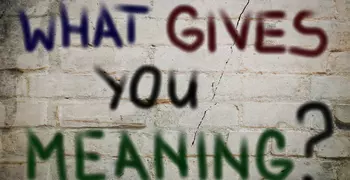
We’ve all heard the quote, “There’s a reason your windshield is bigger than your rearview mirror; where you’re headed is more important than what you’ve left behind."
For many people in midlife and beyond, both are important. And, when we look in both
directions, we’re often faced with the current mirror.
In my years of coaching people in their inevitable transitions, I’ve observed that as many as 1-in-3
people experience a “mirror crisis.” They don’t like what they see in the mirror. Not just their aging
body, but, their aging life. They feel an expectations gap – “This isn’t what I was expecting.” “If only
I was more of this.” “If only I was less of that.” The gap is often triggered by deaths, illnesses,
moves, retirement, and more. Or, it can be the experience of simply feeling the energy draining
drudgery of more of the same old conversations and routines. It can also be the normal, yet panicky feeling of facing the ticking clock of mortality.
Why is a Mirror Important in Life?
Mirrors force us to face ourselves. They force us to examine ourselves. To face the mirror honestly
requires us to accept our own mistakes instead of blaming others. Getting comfortable with our
physical and psychological reflection allows us to accept ourselves exactly as we are. And,
sometimes it reflects a “late-life crisis.”
What’s a Late-Life Crisis?
A late-life crisis is different than a midlife crisis where we take stock of “Is this all there is?” It’s a deeper existential questioning about “time.” It’s the reality that time is our most precious currency
and there’s little of it left. How much time do I have and what do I want to do more of and less of in
my lifetime?
Naturally, we all have those days when we face the mirror (figuratively as well as literally) and
don’t like what we see. We feel like something’s missing. So, what do we do?
Learn to Unpack
A first step might be to face the mirror with a “Purpose Partner” – someone who is willing to dig
into the deeper existential time-related questions. Use this Late-Life Crisis Quiz as a structure for a
conversation facing the mirror.
Late-Life Crisis Quiz
- Do you often find yourself looking in the mirror and thinking, “Who is this person?”
- Do you feel reluctant to tell people your age?
- Do you obsess about your appearance, trying to “anti-age” to look younger?
- Do you often compare yourself with others your age (and worry that you’re not measuring up)?
- Do you often find yourself thinking about your mortality?
- Do you avoid discussing with your loved ones what you would like for them after you’re gone?
- Do you often question the value of your religious or spiritual beliefs?
- Do you often feel down or empty for long periods of time?
- Do you often feel detached from activities that once gave you pleasure?
- Do you feel bored or stuck in your personal relationships?
You might relate to a few of these behaviors, thoughts, and feelings. But if you answered a definite
“yes” to more of the questions than you answered “no” to, it’s possible that you are in (or entering
into) a late-life crisis.
Learn to Repack
A second way to face the mirror is to ask, “What is a good life, now?”
A formula for the Good Life that I’ve studied and written about in Repacking Your Bags: Lighten
Your Load for the Good Life (with my coauthor and philosophy professor David Shapiro) helps you
to face the mirror by assessing four key elements of a good life:
- Place – Where do I want to live?
- People – Who do I want to live with/around?
- Work – What do I want to spend my time doing (or not)?
- Purpose – What do I want to contribute to life?
By facing the mirror, happiness often takes center stage. “Now can I be happy?” Consider shifting
your quest from focusing your time on pursuing personal happiness to actively contributing to the
well-being of others. By “growing and giving,” you not only face the mirror with a smile, but you
also create a ripple effect of purpose in the world around you. You just need to make your life count one day at a time.









